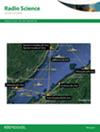短波系统电离层相关性统计分析
IF 1.6
4区 地球科学
Q3 ASTRONOMY & ASTROPHYSICS
引用次数: 0
摘要
要改进短波系统,就必须对电离层的时空变化进行统计分析。基于标准化欧氏距离算法,利用多源电离层同化数据、国际全球导航卫星系统服务垂直电子总含量数据和电离层探测仪数据对电离层相关距离进行了统计分析,得到了电离层相关距离随当地时间、磁纬度和季节的变化情况。统计分析结果表明,电离层相关距离在赤道电离层异常波峰区域呈现最小值。此外,中磁纬地区的子午相关距离大于其他地区。带状电离层相关距离呈现出明显的局时变化。经向相关距离和带状相关距离在春季和秋季的变化趋势相似。电离层相关距离随当地时间、磁纬度和季节的变化规律可用于选择电离层探测仪台站、短波多站系统和短波无线电信标的最佳位置或间距。本文章由计算机程序翻译,如有差异,请以英文原文为准。
Statistical Analysis of Ionospheric Correlation for Shortwave System
Statistical analysis of the temporal and spatial variations in the ionosphere is necessary to improve the shortwave system. Based on the standardized Euclidean distance algorithm, multisource ionospheric assimilation data, International GNSS Service vertical total electron content data, and ionosonde data are used to statistically analyze the ionospheric correlation distance, and the variation of ionospheric correlation distances with local times, magnetic latitudes, and seasons are obtained. The statistical analysis results show that the zonal ionospheric correlation distance presents minima in the equatorial ionospheric anomaly crest regions. Additionally, the meridional correlation distance in middle magnetic latitudes is greater than that in other regions. The zonal ionospheric correlation distance presents obvious local‐time variability. The variation trends of the meridional and zonal correlation distance during spring and autumn are similar. The patterns of the ionospheric correlation range variation with local times, magnetic latitudes, and seasons can be used to select the optimal locations or spacing for ionosonde stations, shortwave multi‐station systems, and shortwave radio beacons.
求助全文
通过发布文献求助,成功后即可免费获取论文全文。
去求助
来源期刊

Radio Science
工程技术-地球化学与地球物理
CiteScore
3.30
自引率
12.50%
发文量
112
审稿时长
1 months
期刊介绍:
Radio Science (RDS) publishes original scientific contributions on radio-frequency electromagnetic-propagation and its applications. Contributions covering measurement, modelling, prediction and forecasting techniques pertinent to fields and waves - including antennas, signals and systems, the terrestrial and space environment and radio propagation problems in radio astronomy - are welcome. Contributions may address propagation through, interaction with, and remote sensing of structures, geophysical media, plasmas, and materials, as well as the application of radio frequency electromagnetic techniques to remote sensing of the Earth and other bodies in the solar system.
 求助内容:
求助内容: 应助结果提醒方式:
应助结果提醒方式:


